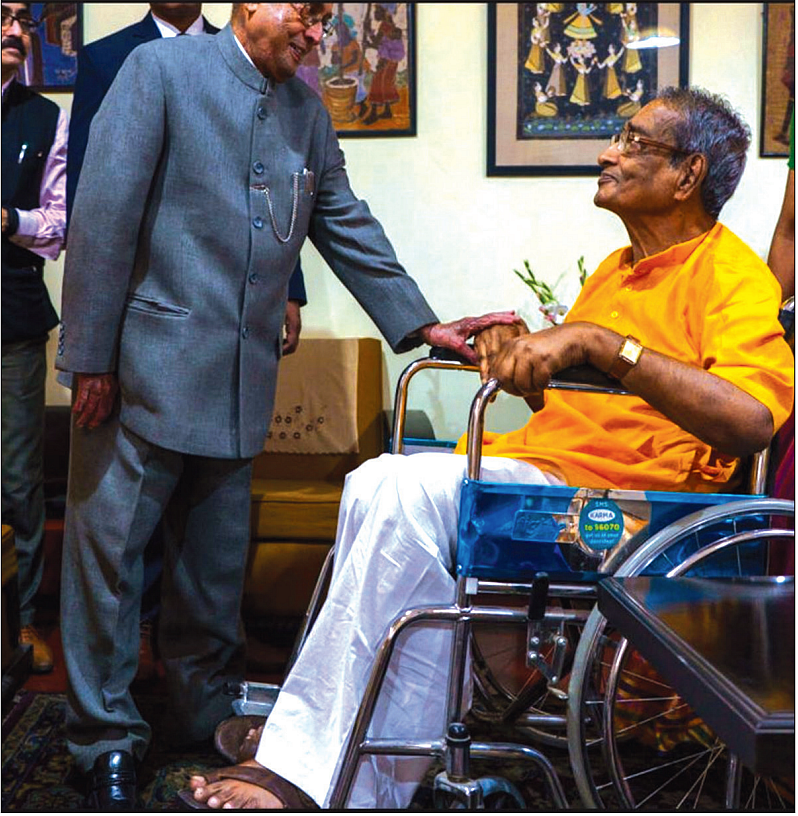Obituary: DPC, a philosopher and scholar-politician remembered by academics across the world
Prof Debi Prasad Chattopadhyay passed away last Sunday but sadly, there were no condolence messages from either the President of India Ram Nath Kovind or Prime Minister Narendra Modi

Padma Vibhushan professor Debi Prasad Chattopadhyaya, a rare scholar politician who was former Union minister of commerce in the 1970s passed away last Sunday, February 13, 2022 in Kolkata.
Known popularly as DPC, he was also called ‘Chhoto Debida’ by his juniors to differentiate him from the older DPC, a Marxist. DPC lived an extraordinary life and wrote an extraordinary number of books, said to be more than 35 in both English and in Bengali. He also anchored the ambitious 100-volume project, ‘History of Indian Science, Philosophy and Culture’. It eventually crossed 140 volumes.
He also founded the Indian Council of Philosophical Research (ICPR) and the renowned Raja Rammohan Roy Library Foundation. He was awarded the Padma Vibhushan in 2009. He will be remembered for chairing the first National Commission on Teachers, which came up with the seminal report, ‘The Teacher and Society’.
As condolences poured in from his former students and admirers from across the world, a doctor reminded them of his role in getting the Medical Termination of Pregnancy Act (MTP) enacted when he was deputy minister in the Union Health Ministry.
There were no condolence messages from either the President of India, Ramnath Kovind, or Prime Minister Narendra Modi, although he was Governor of Rajasthan in the early 1990s and was honoured with Padma Vibhushan in 2009. The national media did not bother to even carry the news of his demise.
Chattopadhyay did his Masters in philosophy, LL.B and Ph.D at the University of Calcutta and Ph.D. from the London School of Economics. Among the 35 and odd books that he authored, several are still rated highly internationallyin academic circles. Some of the acclaimed books he wrote include ‘Individuals and Societies: A Methodological Inquiry’ (1967), ‘History, Individuals and World’ (1976), ‘Sri Aurobindo and Karl Marx: Integral Sociology and Dialectical Sociology’ (1988), ‘Anthropology and Historiography of Science’ (1990), ‘Sociology, Ideology and Utopia’ (1997) and ‘In Defence of Ancient Indian Materialism’.
He was a Life Member of the Russian Academy of Sciences and a Member of the International Institute of Philosophy, Paris.
Prime Minister Indira Gandhi picked up progressive-minded scholars into the Congress in the late 1960s, like Chattopadhyay when he was Professor of Philosophy at Jadavpur University. During the Emergency he opted to return to the academics.
He founded the ICPR in 1981 and was the founder editor of the Journal of ICPR, Sandhan. Chattopadhyay will also be remembered as the chairman of the National Commission on Teachers (1983-85) which brought out the document ‘The Teacher and Society’.
The report cautioned against the growth of vested interests in the teaching community and treating parents of students as clients. “Our enquiries often revealed utter disillusionment of the public with teacher performance,” the report had stated and pointed out two factors.
One was the pre-occupation of teachers with private tuition and other income-generating activities; and the other was increasing politicisation of educational institutions and teachers’ organisations. The Chattopadhyay panel also focused on the need for a new policy of ‘decentralisation’ of educational administration.
‘While increasing state control over non-Government institutions through the grant-in-aid device had seemed to give a sense of greater security to the teachers, paradoxically it had also vitiated the climate of aided institutions to such an extent that their teachers were no longer inclined to take their work seriously’.
About government institutions, the panel had observed the stranglehold of bureaucratic control and its remedial suggestion of rescuing them from the stranglehold of anti-education bureaucracy and suggested giving them “greater autonomy and make them answerable to a properly constituted managing committee”.
Several universities in India conferred honorary D.Litt. degrees on him in recognition of his scholarship and academic leadership. The ICPR Silver Jubilee Life-Time Achievement Award for the year was conferred on him in 2010.
(IPA Service)
(The article was published in National Herald on Sunday)
Follow us on: Facebook, Twitter, Google News, Instagram
Join our official telegram channel (@nationalherald) and stay updated with the latest headlines
